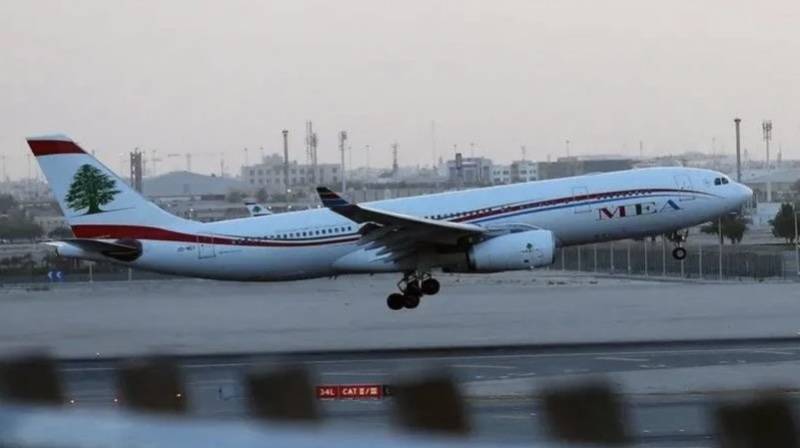
Airplane belonging to Middle East Airlines. (Credit: AFP)
Want to get the Morning Brief by email? Click here to sign up.
A country choosing to “randomly change its timing could cause a lot of chaos,” cybersecurity expert Roland Abi Najem told L’Orient Today after Lebanon’s government announced that the transition to daylight savings time has been postponed. The transition into summer timing — previously scheduled to take place this weekend — will now occur on midnight April 20. Middle East Airlines yesterday responded to the announcement saying they will push forward the departure times of all departing aircraft by one hour, starting from midnight this Saturday until midnight April 21. Cybersecurity expert Majd Dhainy told L’Orient Today that the Lebanese government must notify officials responsible for the network time protocol (NTP) servers for the synchronization of “mobile phones, laptops and other electronic devices” for the new timing to “go smoothly.” The Grand Serail has not responded to questions regarding the consequences of the decision or whether a procedure was launched to notify NTP servers.
Shortly after preliminaries for a legislative Parliament session halted yesterday, caretaker Prime Minister Najib Mikati called on legislators to convene “to adopt reform projects,” on which progress has been “very slow,” according to a statement released the same day by an International Monetary Fund (IMF) official. A delay by the Joint Parliamentary Committees to approve laws up for discussion led to the cancellation of next Monday’s Parliament bureau meeting required to call for a legislative session, a Parliament source told L’Orient Today. The same source said that one of the laws pending approval is the draft capital control law, which is among the reforms set in a staff-level agreement last April by the IMF to unlock a multibillion-dollar aid package. “So far, we have chosen the worst option,” Mikati said, criticizing a lack of agreement to adopt internationally-mandated reforms. The same day, IMF mission chief Ernesto Rigo expressed disappointment in the “implementation and approval of legislation” related to reforms, also urging authorities to stop “borrowing from the central bank” as they had previously advised against. Legislative sessions, nonetheless, remain controversial for some MPs amid the presidential vacancy, with nearly half of legislators announcing a boycott of Parliament meetings that aren’t dedicated to choosing a next head of state.
Cabinet is scheduled to meet next Monday to discuss the economic crisis’ impact on “different sectors, including public sector employees and retirees,” while employees of state telecom operator Ogero are expected to start an open-ended strike today to demand a salary adjustment. Ogero employees will continue to conduct repairs during their strike demanding “an amendment of salaries,” a member of the striking employees’ syndicate, Marwan Halabi, told L’Orient Today. Ogero employees ended a weeks-long strike, during which telecom outages proliferated across Lebanon, last August after former President Michel Aoun approved funding for an increase to their salaries. Public administration employees, meanwhile, have been on strike for eight months to demand salary adjustments, while public school teachers partially returned to classrooms earlier this month as some of their colleagues continued to protest after a monthslong strike with the same aims.
Family members of the Aug. 4, 2020 Beirut port blast victims met with Higher Judicial Council head Souhail Abboud, who denied that “the investigation was stopped and frozen,” a spokesperson for the victims' relatives said. “If the investigation does not continue, we will take to the international community,” one of the dozen port blast victims’ relatives present at a sit-in outside the Beirut Justice Palace added. Earlier this month, Australia presented a petition to the United Nations Human Rights Council urging member states to approve an independent fact-finding mission investigating the blast. Port blast probe lead investigator Judge Tarek Bitar in February indefinitely postponed a series of hearings with officials named in the investigation after Lebanon’s top prosecutor revoked an attempt to relaunch the probe — which had been frozen for over a year due to unresolved complaints against the investigator. This March, relatives of the blast victims held their 31st monthly vigil commemorating the tragedy that claimed more than 220 lives and injured more than 6,500 people. The regional office of the United Nations Educational, Scientific and Cultural Organization (UNESCO) in Beirut has allocated $2.2 million for associations, collectives and groups of artists, creators and cultural professionals in an attempt to revitalize cultural life through a call for proposals to develop productions in areas affected by the explosion.
Unknown persons in Sour opened fire on the car of a Hezbollah security official’s son, L’Orient Today’s correspondent in the South reported. The attackers, reportedly aboard a motorcycle, used military machine guns to target a car parked in front of Al-Sharq Sweets near the Abu Deeb roundabout in the center of Sour. No injuries have been reported so far. Rampant firearm ownership has repeatedly endangered citizens across Lebanon.
In case you missed it, here’s our must-read story from yesterday: “Can a water pumping station rebuild trust in public services?”
Compiled by Abbas Mahfouz